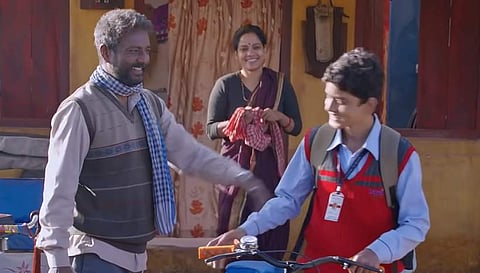Pareeksha Movie Review: Adil Hussain shoulders a well-intentioned social drama with minimal frills
Rating:(3 / 5)
At one point in Pareeksha, cycle-rickshaw driver Buchchi Paswan (Adil Hussain) is told that his dreams of getting his son to study in an elite school is like one of the ‘haseen sapne of Mungerlilal’. Mungerilal, of course, is a character from one of director Prakash Jha's earlier films who fulfilled his deepest desires through daydreams. However, Buchchi isn't one to be satisfied with just dreaming. He wants to make it a reality, even if it will cost him everything.
Cast: Adil Hussain, Priyanka Bose, Shubham Jha, Sanjay Suri
Director: Prakash Jha
Streaming on: Zee5
Pareeksha begins with Buchchi taking a bunch of school children to the elite (read CBSE) Sapphire School in Ranchi. His son, Bulbul, is an exemplary student but is stuck in the local government school where it’s a rarity to even spot teachers. So Buchchi uses hook and unfortunately, crook too to gain his son admission. But this isn't a film about how Bulbul fights obstacles and succeeds in the pareeksha of his life. This is a story about Buchchi and how his life spirals out of control, when he realises he’s unable to manage the burden of expensive education. We never get to see how Bulbul (Shubham Jha, whose performance grows on you), who doesn't quite understand basic English, fits into the world of the 'English speaking-sophisticated' Sapphire students.
While this lack of emphasis on Bulbul's life may have come across as a bigger problem, the earnestness of Buchchi and Priyanka (Priyanka Bose) keeps afloat a narrative riddled with cliches. Though Prakash Jha trains all the spotlight on Buchchi, Priyanka is solid as the silent, comforting mother. Her silences are as effective as the sharpness of her meltdowns. But the film is mostly about Buchchi and it is through him that the director delivers a scathing commentary on the education system in India, including the not-so-subtle casteism, and the growing chasm between the haves and the have-nots. Just like every Prakash Jha film, the intent is on point, but in this film, the narrative does feel a tad outdated. For instance, the Sanjay Suri cameo simply exists to serve as a cursory reminder that there are good cops too. Although inspired by a real-life police officer, Sanjay's role as a khaki-clad version of Super 30's Anand Kumar, does little to the overall narrative of Pareeksha.
Despite the proceedings feeling rather dated, the effective performances and honesty in the writing keep us invested. Take the scene where a rich man isn't pleased with the rickshaw wallah's son going in the same vehicle as his child. We are primed for something heroic to come from the dad in front of his son, who is being humiliated before his classmates. But all Buchchi does is apologise. This lack of response is not only stinging but also reflective of the kind of oppression people like Buchchi are used to. But before we write Buchchi off as a father who can't really stand up for his son, we must remember that he gets a cycle for Bulbul. He is a practical man, and this characteristic is maintained till the end where he gets shown as someone who is always aware of the bigger picture, even if it costs him the smaller joys.
Just like Buchchi, the film too concentrates more on the bigger picture, on conveying the angst against uneven educational opportunities in our society, and much like him, the film too forgets the important smaller details that would have made this story more personal. But it’s still tolerable—in a sense, like marks awarded to students for getting the steps right even if the answer itself isn’t on point.

